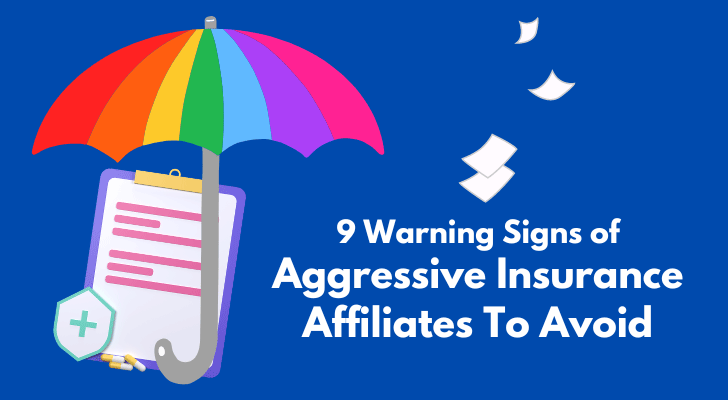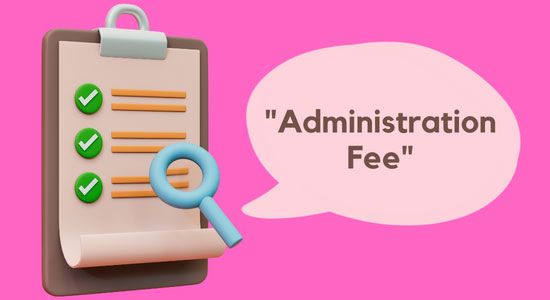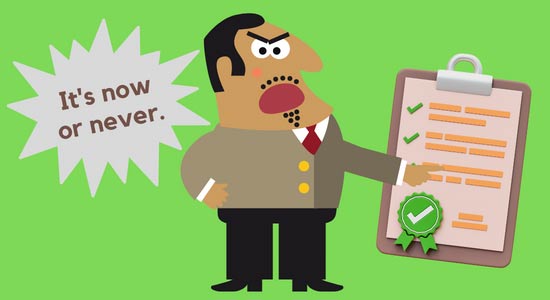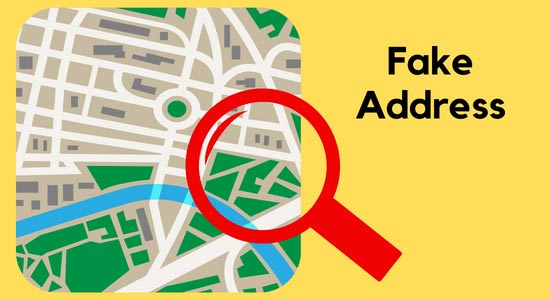Affiliate marketing is on the rise and no wonder why, so are aggressive insurance affiliates as well as bogus insurance schemes. It doesn't matter if insurance is real or fake. Those sellers know that some people overlook small details or jump into a deal without thinking things through.
Unfortunately, many people are getting ripped off or scammed because of the way they are marketed. It’s important to be aware of the warning signs of insurance scams so you don’t fall victim to one. In this post, I will show you 10 common red flags of insurance scams so you can spot them and avoid them in the future.

What is an Insurance Scam?
An insurance scam is a fraudulent scheme designed to defraud insurance companies or policyholders. Scammers may pose as legitimate insurance agents or representatives, often using fake identities and false documents, to sell bogus policies or collect personal information. They may also attempt to unlawfully obtain benefits or claims payments by submitting false or inflated claims.
Scammers often target seniors, but not exclusively. They also target other individuals who may be unfamiliar with the complexities of the insurance system. They may also target people who have recently experienced a major life event, such as a death in the family or a natural disaster, when they may be more vulnerable and less likely to question unusual requests for personal information or premium payments.
Several warning signs can help you spot an insurance scam. Be wary of anyone who:
- Solicits you by phone, email, or text message out of the blue
- Pressures you for personal information or payment immediately
- Offers coverage that seems too good to be true
- Uses high-pressure tactics to get you to sign up on the spot
- Asks you to pay cash only or provides an unusually long grace period before coverage begins
- Refuses to provide written documentation of the policy terms
- Is unwilling to answer your questions about the policy or company
1. Cold Calls and Unsolicited Emails
One of the most common ways that scammers will try to reach out to potential victims is through cold calls or unsolicited emails. These are typically mass-produced messages that are sent out to a large number of people in an attempt to hook someone.
Even real insurance companies often contact you out of the blue, because they buy a list of consumers from shady marketing agencies. Even if the insurance company is a legitimate, reputable one, the affiliates often buy a list of customers and send random invitations just to make money.
If you receive a cold call or unsolicited email from an insurance company, be wary. There are a few key things to look out for that could indicate that it's a scam:
- The message is generic and doesn't address you by name
- It includes urgent language or threats of legal action
- It asks for personal information such as your Social Security number or credit card number
- It promises coverage that sounds too good to be true
If you receive any communication like this, do not respond and do not give out any personal information. Hang up the phone and block the number. Report the email as spam and simply delete it. If you're unsure whether or not it's a scam, you can always contact the insurance company directly to inquire.
2. Low Rates Plus Admin Fees
When they promise a low insurance rate but they don't clarify the term, the tactics are nothing but a scam.

For example, instead of saying "90% off for the first month", they don't clarify the discount only applies to the first month. From the 2nd month onwards, your insurance fee will shoot up.
Another example is a hidden admin fee that they add retrospectively, such as;
- Because you live in an area with a high risk of flood.
- Because your job is considered a hazardous activity.
Your insurance rate may go up according to your various living circumstances, which is understandable. But they shouldn't be adding an admin fee.
Whatever it is, it's a red flag if the insurance company is not able to provide any concrete evidence to back up its claim. If an insurance company is promising you incredibly low rates, ask them questions and write down your answer. Because it will be useful when you dispute via your credit card company. Check the small writings before you sign the document.
3. Pressure To Buy Now
If the salesperson you're talking to is being pushy about making a decision, then there's no way you should accept the word they say.
There's no reason why they should get you to sign up for a policy on the spot or pressure you to commit to a certain amount of coverage.
If someone is putting this kind of pressure on you, then hang up the phone. If you're still interested in the insurance itself, then it's best to walk away and find someone else to talk to.

If the salesperson you're talking to seems more interested in pushing a product than helping you understand your options, then you should hang up, too. You are a customer. If they're not helping you, you are entitled to say nothing, cut them off, and even make a complaint about that person to the insurance ombudsman.
Some people naturally talk away and talk you out using their sales tactics but they're clearly not looking out for your best interests. It's important that you feel like you can trust the person you're working with, so if you have any doubts, it's best to ignore them.
4. Lack Of Licensing
If an insurance agent or company is not licensed, they are not legally allowed to sell insurance in your state. This means that the policy you buy will be invalid. Invalid means if something goes wrong and you need to make a claim, you will suddenly discover that you're not covered.
To avoid this type of scam, always make sure to check that the agent or company you are working with is licensed in your state. You can do this by contacting your state's department of insurance.
5. Asking For Personal Information Upfront
Asking for personal information upfront is one of the biggest red flags when it comes to insurance scams. If an insurance company or agent asks for your Social Security number, bank account information, or credit card number before you have had a chance to review the policy, be very wary.
They are nothing to do with insurance. It's just a common tactic used by scammers in order to steal your identity or access your finances. Only give out this information once you are sure that you are dealing with a legitimate company and that you have read and understood the policy.
6. Refusing To Provide Written Estimates
When an insurance company refuses to provide a written estimate of the costs of your policy, then it's another no-no.
Insurance companies are required by law to provide written estimates to potential customers, so if the company you're considering doing business with refuses to do so, find another insurer. All legitimate insurance companies know this basic rule, so they're likely to be amateur affiliates.
You can flatly tell them that you are going to look elsewhere because they're not willing to provide the document. Or you can just hang up the phone and block them - they deserve it.
7. Not Letting You Cancel Online
It's good to be able to search for the best insurance deal online, sign up online, and download a policy document as soon as you make a payment. Insurance companies need fewer resources (staff), hence cost-saving for them, so you can get more reasonable insurance rates.
However, your insurance policy will likely be renewed automatically every year, and the only way to cancel is to make a phone call and speak to the agent. They make everything easy for you to buy, and they make it difficult to let you go.
You may have experienced many times before - if you tell them that you don't wish to renew your insurance, they come up with questions (why you wish to cancel) and other offers, one after another.
They may not be "scam", but their tactics are dirty from a customer's point of view.
If they are so adamant and wouldn't let you go, they are wasting your precious time.
You can tell them that your telephone conversation is being recorded, and if they automatically renew against your wish, you will take legal action.
8. Not Letting You Cancel At All
If they take the form of threats to cancel your existing policy if you don't sign up for a new one, the insurance agent is a scammer affiliate. By attempting to manipulate you into signing up for an additional or different policy, these scammers try to make sure that they get paid while putting your current coverage in jeopardy.
It's important to be aware of this type of scam so that you can protect yourself from this kind of fraudulent activity. If someone is threatening cancellation if you don't sign up for something else, it's best to contact a legitimate insurance provider directly in order to ensure that your coverage remains secure.
9. Website with No Basic Information
First of all, if someone contacts you by Gmail (Hotmail, or any free email address), there's not even the slightest room for consideration. Report the email as spam and delete it.
If someone contacts you and the insurance package they recommend sounds attractive, visit the website. If they haven't given you a link to the website, it's already a red flag.
When you visit the website, check if it displays links to the basic information such as;
- Contact form page
- Phone number and street address
- Terms of service
- Privacy policy
- Licence registration number
Copy the street address and check it on Google Maps.
- If the address doesn't exist - leave the website, it's a bogus insurance site.
- If it's in the middle of the warehouse site - it's also bogus insurance.
- If it's a virtual office space, it may be real because a lot of companies operate without a physical address nowadays.

Don’t Ever Let Them Contact You. You Contact Them.
One thing you should definitely do is ignore any insurance company that contacts you directly. There is no need to deal with high-pressure sales tactics from an insurance agent.
Instead, you can find a reputable insurance company online and contact them directly. They will be able to help you figure out what coverage you need and give you a quote without any hassle.
Don't let insurance agents contact you. Ignore ALL the insurance companies that approach you out of the blue.
What To Do If You Think You've Been Scammed
If you think you've been scammed, the first thing you should do is report it to your state's insurance department. You can find contact information for your state's department on the National Association of Insurance Commissioners' website.
You should also contact the company that sold you the policy and explain what happened. The company may be able to help you get your money back or file a complaint on your behalf.
You can send a complaint to the Federal Trade Commission. You may not receive a response from FTC but they take every complaint and record it in the file so they can investigate it in due course.
Conclusion
Being aware of the red flags associated with insurance scams is key to avoiding becoming a victim. Hopefully, this article has helped identify and understand some of these signs so that you can make more informed decisions when it comes to purchasing insurance policies.
Be sure to take your time, research the company or the affiliates offering you a policy, and be especially wary of any offers that seem too good to be true - they likely are!
How I "Finally" Make Over $7,000 Monthly Income
"The most valuable thing I've ever done!"
